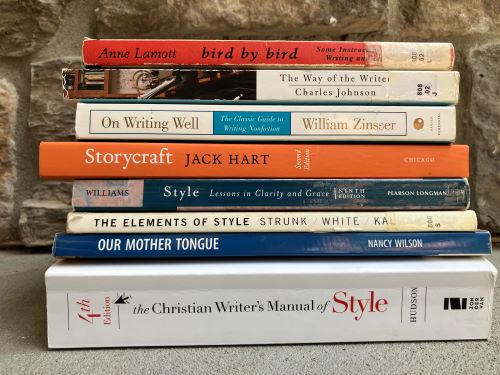by Erin Ensinger
I read stacks of books on writing before I realized the good ones all give similar advice:
- Even published writers find writing difficult.
- Voracious readers make great writers.
- Make yourself write regularly, even when you’re busy or don’t feel like it.
- Revise; revise again; and then revise again.
- Find a capable reader to comment on your drafts.
- Pay attention—everything you read, see, and experience is fodder for your writing.
- Write for writing’s sake rather than for publication since very few people attain fame and fortune.
I found comfort rather than frustration in reading the same advice repeatedly. I came to see how straightforward beginning and maintaining a writing life can be. Perhaps we complicate things because we’re scared to take ourselves seriously as writers. Maybe dreams of writing feel more fun than the daily discipline of a writing life.
I also felt pleased to realize I don’t need to buy the entire writing section of Barnes and Noble. A few carefully-chosen volumes can provide a lifetime of guidance. Read on to discover the books I found most helpful as an ABH writer specifically. Studying any of these books feels like taking a college course on writing, minus the hefty fees—all you need is a library card!
On the Writing Process
On Writing Well: The Classic Guide to Writing Nonfiction, William Zinsser
Feeling depressed over your failure to write the next great American novel? Take heart. Zinsser praises nonfiction as “the new American literature,” encouraging writers to find the genre that feels most natural to them. He also loves those hallmarks of ABH style—simplicity and clarity—and gives practical advice on how to achieve them.
Storycraft: The Complete Guide to Writing Narrative Nonfiction, 2nd Ed., Jack Hart
Stories comprise the heart of ABH books. We tell Bible stories, our own stories, and stories from the cultures we serve. Stories help us teach truth, cultivate hope, and show what following Jesus means in real life. Stories build bridges since many of our readers come from storytelling cultures. Storycraft discusses the art of telling true stories, including why stories matter and how to tell other people’s stories ethically.
On the Writing Life
Bird by Bird, Anne Lamott
Lamott talks less about specific techniques and more about how to live the writing life well. I smiled when she admonished writers to consider their motives. We should not write primarily to be published but because writing helps us see clearly, think deeply, and give of ourselves, according to Lamott. ABH authors already know the best reason to write – for the Kingdom, of course! (Sensitive readers be warned: Lamott’s humor can be a bit rough around the edges!)
The Way of the Writer: Reflections on the Art and Craft of Storytelling, Charles Johnson
Johnson, a fiction writer, gives valuable advice to all writers on the disciplines necessary to the writing life. ABH writers can gain practical suggestions on reading habits, journaling practices, making time for writing, and much more.
Grammar and Style Handbooks:
Our Mother Tongue: A Guide to English Grammar, Nancy Wilson
If you need a refresher course on English grammar, this simple guide takes you through the basics. Wilson frequently uses passages from Scripture and classic literature, rather than contrived sentences, to illustrate her teaching. Tidbits on the history of the English language lend color to this sometimes tedious subject.
The Elements of Style, William Strunk Jr. and E.B. White
This one slim volume contains most everything you need to know about style. Get it, read a point or two every day, and apply it to your work. Now you’re well on the way to simple, clear, yet elegant writing.
Style: Lessons in Clarity and Grace, Joseph M. Williams
Style takes you even deeper into that skill essential for ABH writers—composing uncluttered, hard-hitting sentences. Williams helps us diagnose our writing, providing remedies for snarled sentences and baggy paragraphs.
The Christian Writer’s Manual of Style, Robert Hudson
Should I write “Jesus’ disciples” or “Jesus’s disciples”? Does the closing quotation mark go before or after the punctuation? If you’ve ever lost sleep over questions like these, grab a copy of this guide immediately. ABH editors follow the CWMS as we review manuscripts. Keeping a copy on your desk today may mean less revision time tomorrow!
Do you have a favorite writing book that inspires and challenges you? We’d love to hear about it in the comments!
